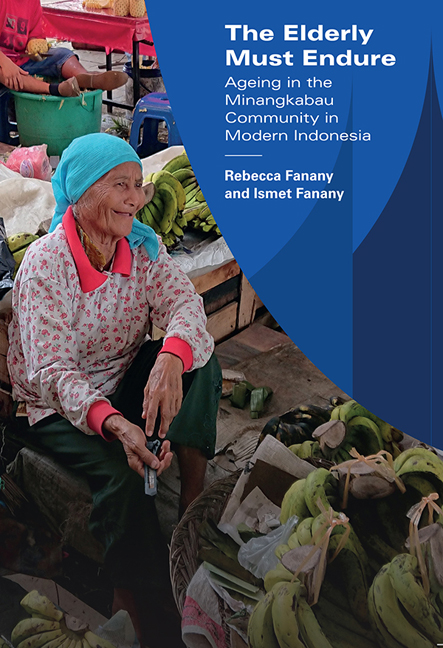Book contents
- Frontmatter
- Contents
- Acknowledgements
- Map of Indonesia
- Map of West Sumatra
- Map of the Village of Koto
- Aminah's Family Tree
- 1 Introduction
- 2 Ageing in the Past and Present
- 3 Adat Traditions and the Elderly
- 4 Religion and the Elderly
- 5 Language and the Elderly
- 6 Ageing in the Village
- 7 Ageing in Padang
- 8 Ageing in the Rantau
- 9 Ageing in an Institution
- 10 Ageing and Cultural Consonance
- 11 The Elderly Must Endure
- Afterword
- References
- Index
- About the Authors
8 - Ageing in the Rantau
Published online by Cambridge University Press: 16 May 2019
- Frontmatter
- Contents
- Acknowledgements
- Map of Indonesia
- Map of West Sumatra
- Map of the Village of Koto
- Aminah's Family Tree
- 1 Introduction
- 2 Ageing in the Past and Present
- 3 Adat Traditions and the Elderly
- 4 Religion and the Elderly
- 5 Language and the Elderly
- 6 Ageing in the Village
- 7 Ageing in Padang
- 8 Ageing in the Rantau
- 9 Ageing in an Institution
- 10 Ageing and Cultural Consonance
- 11 The Elderly Must Endure
- Afterword
- References
- Index
- About the Authors
Summary
MINANGKABAU IN THE RANTAU
There are large communities of Minangkabau living permanently in other parts of Indonesia, outside the regions that customarily use the Minang language and that are associated with long settlement. This represents the outer ring of the Minangkabau world where the individuals involved typically live among and interact with large numbers of people from other linguistic/cultural groups, even if they are part of a significant community of Minangkabau origin. While the proportion of professionals within this rantau population is increasing, the Minangkabau are well known among other Indonesians for their business activities all over the country which have traditionally included various kinds of retail and wholesale activity and restaurants. Restoran Padang (Padang restaurants), which serve Minang food with a characteristic type of service, are found all over Indonesia as well as in Malaysia, Singapore and Brunei. These restaurants, where all the dishes available are placed on the table and diners pay for what they eat, are often the first places where unskilled newcomers from West Sumatra work when they arrive in the rantau. They also serve as important sources of information about the local Minangkabau community or about people newly arrived individuals may know and are looking for.
It is difficult to estimate how many people of Minangkabau origin are living in Jakarta or other parts of Indonesia outside of West Sumatra because information on ethnic background is not collected as part of the national census. However, it has been suggested that as much as 6 per cent of the population of the Jakarta metropolitan area is Minangkabau (Tempo 2012). The approximately 600,000 people this figure represents are the equivalent of 11.5 per cent of the total population of West Sumatra (BPS Sumatera Barat 2016b). While Minangkabau are concentrated in the capital and in the larger cities of other Sumatran provinces, smaller communities can be found almost everywhere in Indonesia. Some of these are very long-standing and began to be established many generations ago. During the New Order period of Indonesia's history under President Soeharto (1965–98), national administration was highly centralized, which resulted in a dramatic increase in the importance of the national capital as the centre of governance, business, and cultural activity. The Minangkabau community in this part of the rantau increased enormously during this time in response to the perception of enhanced opportunities (Kompas 2013).
- Type
- Chapter
- Information
- The Elderly Must EndureAgeing in the Minangkabau Community in Modern Indonesia, pp. 171 - 200Publisher: ISEAS–Yusof Ishak InstitutePrint publication year: 2018



